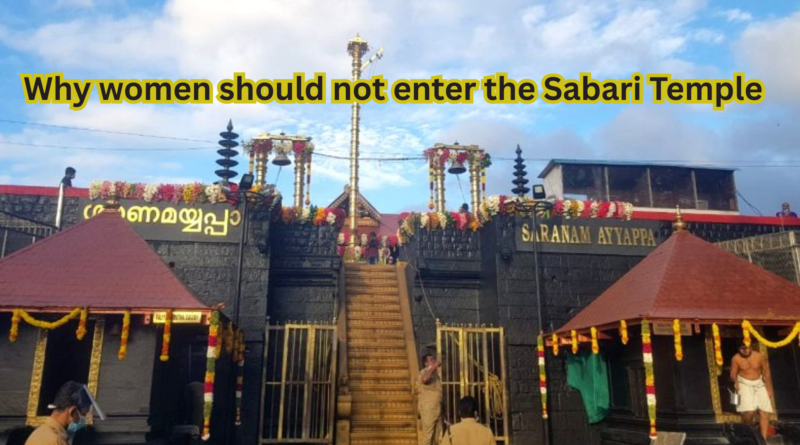Why women should not enter the Sabari Temple
The issue of women entering the Sabarimala Temple in Kerala is a sensitive and highly debated topic that involves religious beliefs, traditions, constitutional rights, and gender equality. Here’s a balanced explanation of why traditionally women of menstruating age (10 to 50 years) have not been allowed to enter the Sabarimala Temple, along with the counterpoints:
1. Religious Tradition and Belief
The main deity of Sabarimala, Lord Ayyappa, is worshipped as a Naishtika Brahmachari (eternal celibate).
votees believe that allowing women of reproductive age into the temple would disrupt the celibate energy of the deity, as Lord Ayyappa is said to be in a meditative state.
The restriction is seen not as discrimination, but as a form of respect for the deity’s unique nature and the vow of celibacy.
2. Custom Followed for Centuries
For many centuries, the tradition has barred women aged 10 to 50 from entering the temple during their menstrual years.
Devotees argue that this is not about impurity or misogyny, but about upholding a long-standing custom specific to this one temple among thousands in India that do allow women.
3. Spiritual Discipline and Pilgrimage Austerity
The Sabarimala pilgrimage is known for its strict 41-day vratam (penance) requiring celibacy, abstinence, and spiritual discipline.
Male devotees believe that maintaining this environment is important, and some argue that the presence of women may be a distraction from this strict spiritual focus.
4.The 1991 Kerala High Court Verdict
In 1991, the Kerala High Court ruled in favor of the ban, stating that women’s entry violated the long-standing temple custom and religious practices.
The court emphasized that the restriction was not a form of gender discrimination but a religious practice protected under Article 25 of the Constitution (freedom of religion).
5. Supreme Court 2018 Verdict and Backlash
In 2018, the Supreme Court ruled that women of all ages should be allowed entry, stating that the ban was unconstitutional.
This led to massive protests by devotees and widespread debate, as many felt the court’s verdict ignored their religious sentiments and traditional practices.
6.Cultural vs. Constitutional Dilemma
Supporters of the ban argue this is a matter of cultural and religious identity, and not just gender equality.
They believe that not all traditions are discriminatory, and some are unique to certain deities and spiritual practices.
Conclusion:
The restriction on women entering Sabarimala is deeply rooted in devotional practices and beliefs, especially around the celibate nature of Lord Ayyappa. While the Supreme Court has legally permitted women’s entry, the issue remains emotionally and religiously charged ,
making it a complex intersection of faith, law, and social change.
Let me know if you’d like a counter-argument supporting women’s entry or a simplified version in regional language.




